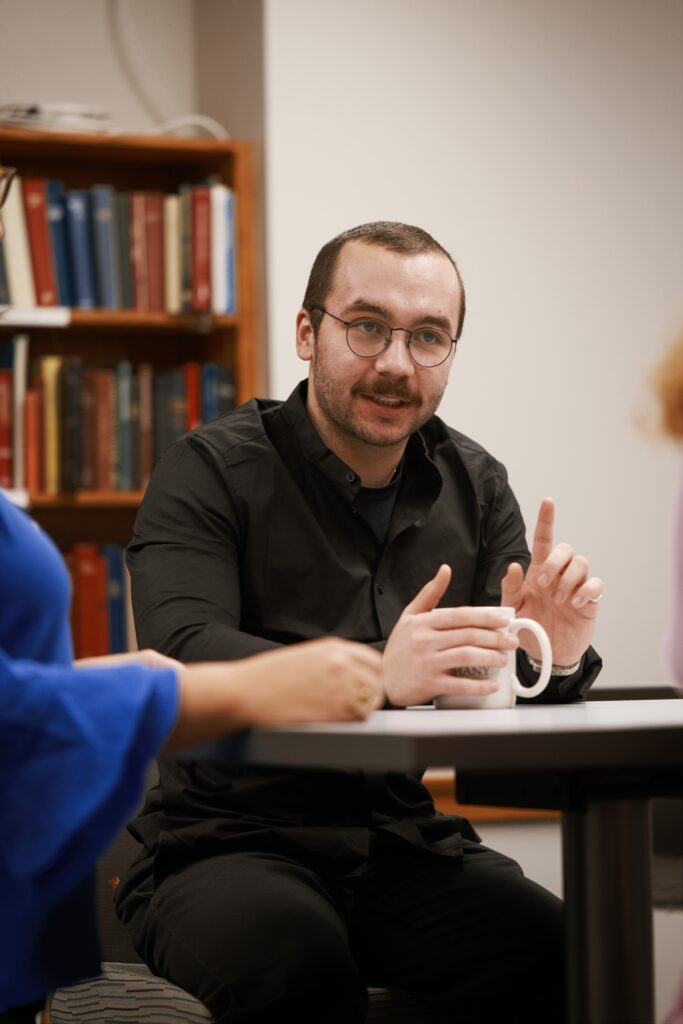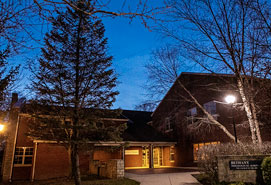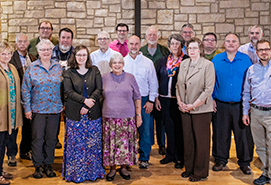A BOLD New Beginning

Omar Gadzhiev followed a twisting and turning path to Bethany. As a master’s degree student, and a participant in Bethany BOLD, however, he believes he has arrived where he needs to be.
“I really appreciate that this is a school with a single direction and mission. I feel like there is a shared goal here, and everyone is moving towards it.”
Born in Dagestan, a republic with a population of three million that forms the southern tip of Russia, he came to the United States in 2015, as an exchange student for his 9th grade year. He decided to complete high school at Northcoast Preparatory and Performing Arts Academy, a small charter school offering the International Baccalaureate Diploma and a strong arts curriculum to students in Arcata, California. He was active in the theater program, and appreciated the personal attention he received at a small school. The principal of that school encouraged him to apply to Manchester University, and he earned a bachelor’s degree there in 2022.
After graduation, he worked on Lauren Meister’s successful mayoral campaign in West Hollywood, California, then worked at a middle school. But since he is in the United States on a student visa, and because he hopes to eventually earn a doctorate, he needed to return to school this fall. He searched Google for a graduate program that would allow him to study philosophy, ethics, and peace studies, but didn’t find the right match. Then a Manchester professor told him about Bethany.
“She said it was a ‘hidden gem,’” Gadzhiev says. One semester in, he agrees. “I have discovered so many things here I never knew about. I had never heard of theopoetics, but writing has always been my passion. The classes here touch on so many topics that interest me.”
No “Bethany Bubble”
He also appreciates the connection to the Richmond community that Bethany BOLD provides. Launched this fall, BOLD (which stands for Build, Organize, Love, and Dare) is a residential program that challenges students to put what they are learning into practice by working at local nonprofit organizations, with a focus on poverty and racial justice. Gadzhiev works at Townsend Center, the oldest community center in Richmond, which serves the African-American community. He works with children in the afterschool program and also volunteers with Bridges for Life, which provides a weekly sit-down dinner to anyone who needs a meal.
“After three months, I feel that I know the Richmond community better than I knew the North Manchester community after four years,” he says. College students often compare their experience to living in a bubble, but Gadzhiev affirms that, “there is no Bethany Bubble.”
“I feel fortunate to be able to help people – either at the Townsend Center, or by serving hot meals at Bridges for Life. These experiences help me to think about the issues I am studying in a concrete way. I am grateful that all of my experiences — in the classroom, at work, or in the solitude of my room — are all related. Because of BOLD, I am able to connect all aspects in my life under one big idea. I can seek knowledge and then implement it. The program allows you to take action to try to address the problems that you see.”
Finding a Faith Community
Gadzhiev’s family includes members of both Russian and Ukrainian Orthodox churches, as well as followers of Islam. Growing up, he says saw both the beauty and ugliness of organized religion. In high school and college, his friends tended to describe themselves as, “spiritual, but not religious.”
In Richmond, however, he has found a committed and diverse faith community. He is currently attending Bethel African Methodist Episcopal Church, and he is seeing the value of communal faith.
“In the past, I saw the institution and the individual at odds with one another, but I see value in practicing faith together. I can feel a part of something bigger than me, yet still have my individuality,” he says.
“It can be difficult to find a spiritual home. When I was growing up, religion was not a big part of my life, but Islam was a big part of the culture, so it was part of how I grew up. When I moved to California, I traded an authoritarian view for an individualistic one — but neither of those is what I am seeking. What I am experiencing now gives me a new perspective on faith, and on how I as an individual can relate to a faith community.”
A Russian in America
“Russian has become a curse word again,” says Gadzhiev.
When he first arrived in America, people he talked to were mostly curious about his background, and wanted to talk with him about Russian culture, literature, and theater.
“At first, I found that people found it ‘interesting’ that I was from Russia.” But after Russia’s annexation of Crimea, and especially after the invasion of Ukraine, things have changed. “It’s hard to still be proud of where I am from and communicate to people what I love about Russia.”
“I have family in both Russia and Ukraine. I was drafted to serve in the Russian Army. I have a family member who asked me, ‘why don’t you come back,’” he recalls. “I am finding it hard to communicate to my family why I am still here. I try to explain that I have a blanket opposition to all war, not just one particular conflict. I also know that if I leave the United States, I won’t be able to come back.”
As an international student, he can legally remain in this country. He remains able to do so while completing master’s and doctoral degrees. What will happen afterwards, he doesn’t know.
“My dream was always to be part of the political world, and perhaps work in government, but that doesn’t seem possible to me now because of my background,” he says. “When I talk to my mother, she says, ‘I still see you as an ambassador.’ I wonder, ‘from what country and to what country?”
He tells of his experience canvassing during the mayoral campaign in West Hollywood, going door-to-door to convince Russian immigrants to support his candidate. At the beginning of each interaction, he had to pay close attention to slight variations in accent and other subtle clues to avoid saying the wrong thing. Among Americans, he sometimes doesn’t share his background, uncertain how he might be received.
“I ask myself, ‘who am I to them?’ and ‘how do they see me?’ People are often unable to separate individuals from the country they come from. There is an unwillingness to humanize people, so for me, there can be a lot of acting that comes in.”
But Gadzhiev aspires to be his authentic self and to live a coherent and integrated life.
“I hope for a certain ethical consistency. In the jobs I pick, in the papers I write, in the courses I take.” says Gadzhiev. “One of the things I appreciate about being at a Seminary is that people are willing to discuss good and evil. I like to be able to identify something as evil that is beyond debate. I hope that my time at Bethany will help me develop that clarity and consistency for myself.”
Written by Jonathan Graham
This article originally appeared in the Fall/Winter 2024 issue of Wonder & Word.








 Green Circle: Bethany invests in 100% renewable energy.
Green Circle: Bethany invests in 100% renewable energy.